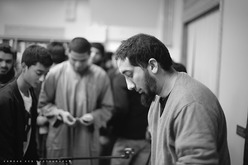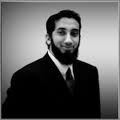
PICTURE COURTESY: KAMRAN XEB
My journey to Islam is similar to many. I was raised a Muslim and my family moved to the United States when I was 15. In a matter of a few years I managed not only to lose my religion as a result of company and environment but also developed a skeptical attitude towards religion especially after a couple of philosophy courses.
As I would start sitting in study circles of one group, over time I would get to hear about the deviations of the ‘other’ group that is literally down the street. I would learn about how lost, confused, misguided or even dangerous to my own salvation they are. For better or for worse, I developed a pattern of learning. Every time I heard about a deviant sect or group (in the eyes of the people I would be taking from), I would make it a point to go and speak with the ‘deviants’ and learn what they had to say in order to hear it directly from the horse’s mouth. Looking back I realize that was a dangerous thing to do at that age I was but that was the approach I took to come back to Islam in the first place.
I wouldn’t have considered turning back to deen unless I had some degree of open mindedness in me. I couldn’t just turn that part of myself off. I had to consider what was being said for myself. After studying some Arabic and being exposed to several schools of thought ranging from the ultra-traditional, movement oriented, literalist, western academic to name a few, I came to certain conclusions about my religion that I still hold dear. In this brief article I want to share those with you.
- That main stream Islam as is manifest today is not a monolithic thing. Pretending that it is amounts to a denial of reality. Muslim thought varies on some core issues within that spectrum but there is also a tremendous amount of agreement.
- That I will remain true to myself, loyal to my Messenger salallahu alaihi wasallam and sincere to my Master to the best of my ability. As a result I will disagree with ideas, theories and verdicts respectfully even if they are coming from sources whose judgment in other matters I find sound if in my conscience I cannot reconcile them with the Islam I continue to learn and love.
- That I will not voice my personal disagreements in the public sphere because no benefit comes from it. I’ve been around debates, daleel battles and name calling long enough to distinguish all of that from pointless bickering.
- That I will voice my disagreements in private settings with the scholars and intellectuals who hold those views not to debate but to better understand the basis for their positions. That I will remain completely open to the possibility that I may have been wrong in my own assumptions about that particular issue.
- That I will take my Qur’an studies very seriously throughout life and will respect both classical and contemporary scholarship on the Qur’an even if I find things stated that are unsubstantiated (based on my limited knowledge). I will not dismiss an author because he/she says something on a particular issue I completely disagree with. I will continue to benefit from such an author while maintaining my respectful disagreement on whatever that issue may be.
- That I will seek counsel of multiple scholars on difficult tafseer issues before holding an opinion.
- That I will not be moved by the ideological labels and boxes that so many Muslims have become obsessed with today. That I will refuse to reduce people to labels. I will fully endorse truths that are being said regardless of who is saying them.
- That I will not be intimidated by the allegation that agreeing with one statement someone makes is tantamount to me agreeing with everything that individual has to say on any issue; that somehow agreeing with someone on one issue is a blanket endorsement of them.
- That my own life is very short and I will spend whatever little energies I have spreading and sharing what I believe to be good and not exhaust my energies refuting ideas of other Muslims even if I completely disagree with them. I won’t do so because I believe a sound education in the Qur’an and Sunnah will automatically diminish the significance of those fringe ideologies. The extremes in any religion feed on conflict and attention. I won’t be duped into thinking that somehow I’m ‘forbidding the evil’ while all I’m really doing is perpetuating an endless debate that produces no tangible good in my life or anybody else’s.
- That I will acknowledge good qualities and contributions of Islamic efforts even if at a grand scale I don’t agree with the strategy or vision they may have adopted.
- That outside of the authentic noble hadith traditions that speak of good manners, the merits of deeds and encouragements, I will not be citing ahadith in any of my talks. I will do so purely out of love and respect for the hadith tradition. I don’t have the scholarly and academic wherewithal to know the complete context, in-depth analysis and historical discourse among the great scholars on the hadith so I think it dangerous to simply cite it. It is dangerous because conclusions from that hadith drawn by me or the common Muslim may actually contradict the Sunnah.
- That the one contribution I think I can make for my own benefit, the benefit of my children and Insha’Allah other Muslims is furthering a love, appreciation and understanding of the Qur’an. I will continue to have the utmost regard for all other Islamic sciences. Because I recognize them as specializations, I will continue to rely on scholars I have had the honour of knowing personally in issues pertaining to them.
- That my efforts will be driven by what I believe is the single biggest problem of the ummah today; raising children that love Allah, His Book, His Messenger SAW and the struggle to expose the beauty of this religion to humanity with their positive contributions. We are losing our youth spiritually, morally and even in terms of their identification as Muslims and it all goes back to sound parenting. My children aren’t any safer from the fitnah of our times than yours. We are all in this together and we have to help each other raise tomorrow’s ummah.
- That I will not deal with issues of fiqh publically for same reasons I won’t discuss ahadith beyond my intellectual and academic capacity. It is a specialized science and you should speak with a specialist just like I do when I have a question.
Ustad Nouman Ali Khan
Founder & CEO, Bayyinah Institute
HOTD Columnist
